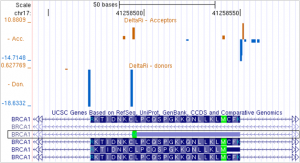Shannon Pipeline for Human mRNA splicing and transcription factor binding site mutation analysis
This software is used to predict functionally-significant, non-coding variants in complete genome or exome sequences. Access fast, comprehensive genome-scale analysis for inactivating, leaky or cryptic splicing mutations using the reliable information theory-based methods employed in the Automated Splice Site and Exon Definition Analysis server. The latest release supports multiple input formats and processes all variants in a complete genome is <15 minutes. Available versions include:
- A Web-based online version of the pipeline – now embedded within our MutationForecaster system. Contact us to submit a purchase order or for long term access.
- The standalone product can be custom integrated into your existing NGS software analysis pipeline . It produces the same results as our own web-based service. Please contact Cytognomix if you are interested in this capability.
- It is also distributed as an Application in the Illumina’s BaseSpace system. Download the Shannon_Pipeline Documentation or view a video presentation of results that can be obtained.
Previous trial users of the Shannon pipeline webservice may register with MutationForecaster. After logging in, subscriptions to use the Shannon pipeline and all other products can be activated through the Account menu on the system.
Read testimonials for the Shannon pipeline … Also, US National Cancer Institute renews license to the Shannon human mRNA splicing mutation pipeline.
Tutorials on the Web-based product (for assistance: Contact us):
- How to interpret the results: Play video.
- Basic functionality and how to submit your data: Play video.
New features in Version 2.0:
- now handles insertions and deletions, (in addition to SNP snd DNPs),
- integrated with the ASSEDA software
- exports results to the Cytognomix User Variation Database
- downstream analysis of genes containing mutations with phenotypes and literature evidence with Cytognomix Visual Analytics
- performs gene set, ie. pathway, analysis on the genes found to contain mutations
- has been updated to Ensembl v. 71 annotations
- results can be optionally limited to Refseq genes,
- and contains preset mutation filters to simplify analyses.
Press release: US National Cancer Institute acquires Shannon Human Splicing Pipeline
Download: Product Description and Specifications
![]()
Peer-reviewed publications: B.C. Shirley, E.J. Mucaki, T. Whitehead, P.I. Costea, P. Akan, P.K. Rogan, Interpretation,Stratification and Evidence for Sequence Variants Affecting mRNA Splicing in Complete Human Genome Sequences, Genomics Proteomics Bioinformatics (2013), 11:77-85.
CaminskyNG, MucakiEJ, PerriAM, LuR, Knoll JHM and Rogan PK. Prioritizing variants in complete Hereditary Breast and Ovarian Cancer (HBOC) genes in patients lacking known BRCA mutations. Human Mutation, 37:640-52, 2016
Mucaki, E*, Caminsky N*, Perri A, Lu R, Laederach A, Halvorsen, M, Knoll, JHM, Rogan PK. A unified analytic framework for prioritization of non-coding variants of uncertain significance in heritable breast and ovarian cancer, BMC Medical Genomics, 9:19, 2016.
Lu R, Mucaki E and Rogan PK. Discovery and Validation of Information Theory-Based Transcription Factor and Cofactor Binding Site Motifs, Nucleic Acids Research 2016. DOI: 10.1093/nar/gkw1036
The Ontario Genomics Institute (OGI) and Cytognomix Inc. hosted a 30 minute Webinar about the Shannon Human Splicing Pipeline – software for genome-scale splicing mutation analysis. The webinar powerpoint slides are available (ShannonPipeline-OGI-Webinar-Presentation).
How it’s used…

Mutations in BRCA1 were analyzed for changes in splice site information content and depicted in this custom genome browser track
NGS produces thousands of variants per run. Our software hones in on the very limited number that likely alter mRNA splicing. Variants are categorized by whether they fully or partially inactivate natural splice sites or activate cryptic sites proximate to exons or within them. Results for genome-wide, high throughput sequence data are usually obtained in less than 2 hours.
The pipeline uses our patented and proven information theory-based binding site analysis. The algorithm has been validated in numerous peer reviewed studies of splicing mutations. The Automated Splice Site Analysis system, the predecessor to the Shannon pipeline has been recommended for use in interpretation of rare variants by the American College of Medical Genetics and Genomics in their published guidelines and standards (Genet. Med. 7, 571–583). The FDA has determined that this software is a medical device under Section 513(g) of the US Federal, Food, Drug and Cosmetic Act, however, it is not yet approved for diagnostic use. The Shannon pipeline is covered by US Patent No. 5,867,402.
Presentation at BioIT World 2012 of the Shannon pipeline:
